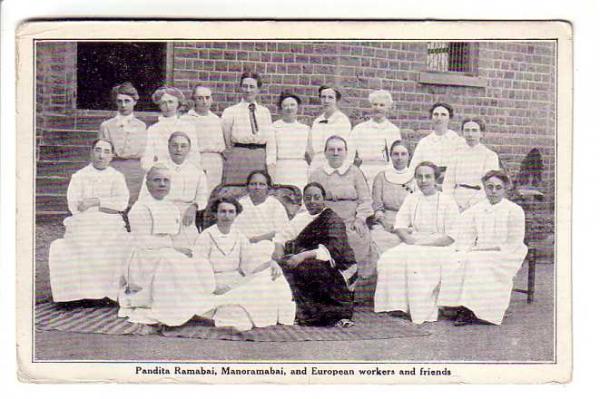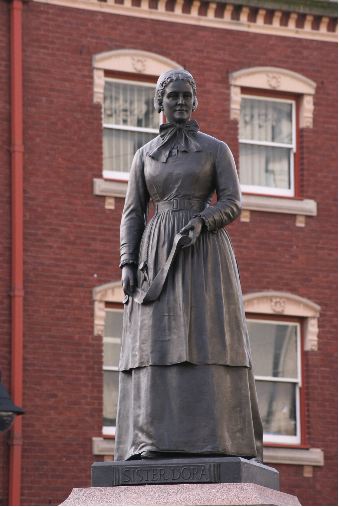|
Matilda Sturge
Matilda Sturge (29 May 1829 – 13 June 1903) was a British Quaker minister, poet and essayist from Bristol. She wrote about the lives of four Quaker women who had achieved because they were allowed the freedom to do so. Sturge is considered to have taken an underrated role in the renaissance in the Quaker movement. Life Sturge was born in Wilson Street in the area of Bristol known as St Pauls in 1829. Her parents were Sarah (born Stephens) and Jacob Player Sturge. Her father was a surveyor. She was raised in a strict Quaker family where her dress was restrained and her reading and entertainment was restricted. These strict rules were imposed when most of her peers were experiencing more freedom from their Quaker families. Joseph Sturge the leading abolitionist was her first cousin. She was the sixth of a family of eight. Her brothers were teased for their clothes but their father told them it was "suffering for righteousness". She wrote essays and biographies of leading Quakers ... [...More Info...] [...Related Items...] OR: [Wikipedia] [Google] [Baidu] |
St Pauls, Bristol
St Pauls (also written St Paul's) is an inner suburb of Bristol, England, situated just northeast of the city centre and west of the M32. It is bounded by the A38 (Stokes Croft), the B4051 (Ashley Road), the A4032 (Newfoundland Way) and the A4044 (Newfoundland Street), although the River Frome was traditionally the eastern boundary before A4032 was constructed. St Pauls was laid out in the early 18th century as one of Bristol's first suburbs. History In the 1870s the Brooks Dye Works opened on the edge of St Paul's and became a major local employer, leading to the construction of terraced houses. Together with migration to Bristol, both from overseas and within Britain, this led to St Pauls becoming a densely populated suburb by the Victorian era. The area was bomb damaged during World War II. Rebuilding and investment was focused on new housing estates such as Hartcliffe and Southmead rather than St Paul's, and this contributed to a decline in the quality of the area. Dur ... [...More Info...] [...Related Items...] OR: [Wikipedia] [Google] [Baidu] |
Winscombe
Winscombe is a large village in the North Somerset unitary district of Somerset, South West England, close to the settlements of Axbridge and Cheddar, on the western edge of the Mendip Hills, southeast of Weston-super-Mare and southwest of Bristol. The Parish of Winscombe and Sandford, centred on the Parish Church of Church of St James the Great, includes the villages/hamlets of Barton, Hale, Oakridge, Nye, Sidcot and Woodborough. Winscombe has a few shops and businesses focused in the centre of the village, along Woodborough Road and Sandford Road. There is a doctor's surgery in the village, a vet and two dentists. West of the village is the Max Bog biological Site of Special Scientific Interest. History It has been suggested that the name means a valley belonging to a Saxon named Wine. The parish was part of the Winterstoke Hundred. Winscombe was the subject of a historical and archaeological study led by Professor Mick Aston, published in the ''Proceedings of the Somer ... [...More Info...] [...Related Items...] OR: [Wikipedia] [Google] [Baidu] |
Joseph Sturge
Joseph Sturge (1793 – 14 May 1859) was an English Quaker, abolitionist and activist. He founded the British and Foreign Anti-Slavery Society (now Anti-Slavery International). He worked throughout his life in Radical political actions supporting pacifism, working-class rights, and the universal emancipation of slaves. In the late 1830s, he published two books about the apprenticeship system in Jamaica, which helped persuade the British Parliament to adopt an earlier full emancipation date. In Jamaica, Sturge also helped found Free Villages with the Baptists, to provide living quarters for freed slaves; one was named "Sturge Town" in his memory. Early life Born on 2 August 1793, Joseph Sturge was the fourth child in the family of 12 of Joseph Sturge, a farmer in Elberton, Gloucestershire, and his wife Mary Marshall, who belonged to the Religious Society of Friends (commonly known as Quakers). His brothers included John Sturge, who became a manufacturer in Birmingham, and Edmu ... [...More Info...] [...Related Items...] OR: [Wikipedia] [Google] [Baidu] |
Mary Carpenter
Mary Carpenter (3 April 1807 – 14 June 1877) was an English educational and social reformer. The daughter of a Unitarian minister, she founded a ragged school and reformatories, bringing previously unavailable educational opportunities to poor children and young offenders in Bristol. She published articles and books on her work and her lobbying was instrumental in the passage of several educational acts in the mid-nineteenth century. She was the first woman to have a paper published by the Statistical Society of London. She addressed many conferences and meetings and became known as one of the foremost public speakers of her time. Carpenter was active in the anti-slavery movement; she also visited India, visiting schools and prisons and working to improve female education, establish reformatory schools and improve prison conditions. In later years she visited Europe and America, carrying on her campaigns of penal and educational reform. Carpenter publicly supported ... [...More Info...] [...Related Items...] OR: [Wikipedia] [Google] [Baidu] |
Pandita Ramabai
Pandita Ramabai Sarasvati (23 April 1858 – 5 April 1922) was an Indian Social Reformer. She was the first woman to be awarded the titles of ''Pandita'' as a Sanskrit scholar and ''Sarasvati'' after being examined by the faculty of the University of Calcutta. She was one of the ten women delegates of the Congress session of 1889.During her stay in England in early 1880s she converted to christianity.After that she toured extensively in the United states to collect funds for destitute Indian women.With the funds raised she started Sharada sadan for child widows. In the late 1890s, she founded Mukti Mission, a christian charity at Kedgaon village, forty miles east of the city of Pune. The mission was later named Pandita Ramabai Mukti Mission. Early life and education Pandita Ramabai Sarasvati was born as Ramabai Dongre on 23 April 1858 into a Marathi-speaking Chitpavan Brahmin family. Her father, Anant Shastri Dongre, a Sanskrit scholar, taught her Sanskrit at home. Dongre's ... [...More Info...] [...Related Items...] OR: [Wikipedia] [Google] [Baidu] |
Sister Dora
Dorothy Wyndlow Pattison, better known as Sister Dora (16 January 1832 – 24 December 1878), was a 19th-century Anglican nun and nurse who worked in Walsall, Staffordshire. Life Dorothy Wyndlow Pattison was born in Hauxwell, North Riding of Yorkshire, the eleventh of the twelve children of the rector, Reverend Mark James Pattison (1788-1865) and his wife, Jane (; 1793-1860) Pattison. One of her siblings was the scholar Mark Pattison. Her childhood was overshadowed by the illness of her father, who had suffered a mental breakdown and become violent and domineering. In 1856, she became secretly engaged to James Tate, the son of the headmaster of Richmond School. The Tates were one of the few families with whom the Pattisons had social contact. At the same time she also developed feelings for another man, Purchas Stirke. After her mother's death in 1860, she broke off her relationships with both men. She was able to leave home due to a £90 bequest from her mother. From 186 ... [...More Info...] [...Related Items...] OR: [Wikipedia] [Google] [Baidu] |


